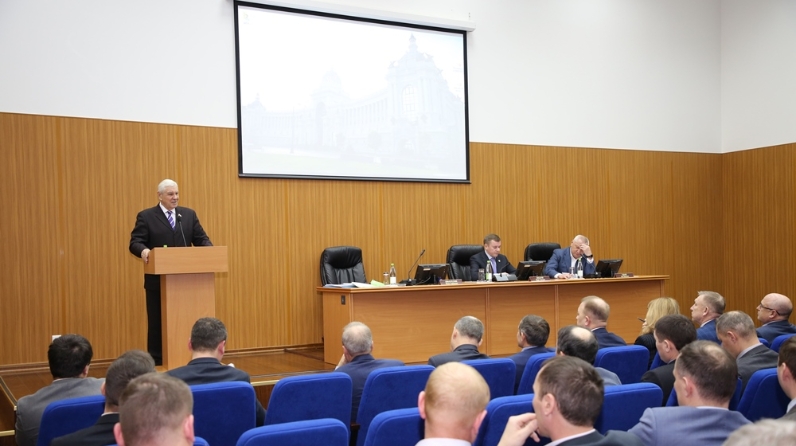Marat Zyabbarov: Organic agriculture is perspective and will increase the profitability and competitiveness of agricultural products

Today at the Ministry of Agriculture of the Republic of Tatarstan, chaired by the Deputy Prime Minister of the Republic of Tatarstan - Minister of Agriculture and Food of the Republic of Tatarstan, Marat Zyabbarov, issues and problems related to the production of organic products and products with improved environmental properties were discussed with agricultural producers and scientists.
As you know, from January 1, 2020, Federal Law dated 03.08.2018 No. 280-ФЗ “On Organic Products” entered into force. Organics became normatively protected, it has a single state logo and a single state register of producers. “Of course, this is the beginning of a new long way. There are many tasks to be solved. We need to go through many stages, and, first of all, involve agricultural producers and show the prospects of developing a new direction. And our task is to combine the efforts of science, best practices, certification and controlling organizations in assisting agricultural producers who decide to switch to the production of organic products, ”said Marat Zyabbarov.
The Head of the Ministry of Agriculture and Food Technologies of the Republic of Tatarstan noted that organic agriculture is a promising area that will increase the profitability and competitiveness of agricultural products, this is a new export supply channel.
The First Deputy Minister of Agriculture and Food of the Republic of Tatarstan Nail Zalakov spoke about the world experience in organic agricultural production. “The international market for organic agricultural production today has reached 90 billion US dollars. Organic farming is practiced in more than 180 countries on 58 million hectares of agricultural land, which employs 2.7 million agricultural producers. According to expert estimates, the market for organic food and beverages grows annually by 12-15%. The total market for organic products in 2020 might be about $ 212 billion. Today, leaders in the production of organic products are Western Europe and North America, the main consumers are the USA, Germany, Great Britain, France and other countries of the European Union. The main constraint to the development of own organic agriculture in European countries is the lack of suitable arable land resources, so EU countries import up to 50% of organic products annually, ”Nail Zalakov shared, noting also that the UN FAO (UN Food and Agriculture Organization) studies according to which, during the reorganization of farms with the introduction of organic production methods, the productivity of small forms of management increased by 116%, income odes of farmers increased by 2-3 times. Production processes that are independent of the supply of fertilizers, pesticides, herbicides, antibiotics, growth hormones, etc. made agricultural enterprises more sustainable.
The First Deputy Minister noted that organic farming in Russia has good development prospects. Possessing unique natural resources (20% of fresh water reserves, 9% of the planet’s arable land, 58% of the world’s reserves of black soil that have not received agrochemicals for more than 3 years and are suitable for putting into circulation as organic, Russia, developing organic agriculture, according to expert estimates , can take from 10 to 25% of the global market for organic products.Today, Russia occupies only 0.18% of the global market for organic products, but we have all the opportunities in a short time to significantly increase export volumes.
In the world, most (about 70%) of organics comes from crops and green livestock feed. The most important export market for Russia and Tatarstan is cereals, since the Republic of Tatarstan is one of the leading agricultural regions of the country. Using 2.3% of Russia's farmland, Tatarstan produces about 4.4% of the country's agricultural products. Based on this, one of our main tasks remains the preservation and restoration of natural soil fertility - one of the main tenets of organic agricultural production. Moreover, the main direction of the republic today is the replenishment of nutrients by the biologization of agriculture.
In 2020, the year the law on organics came into force, environmental issues are of particular importance. Therefore, the second issue of the meeting was ways to solve the problems of agricultural waste disposal. For their discussion, colleagues from the Ministry of Ecology, supervisory authorities, representatives of science and large poultry complexes were invited.
Nail Zalakov focused on the problem of processing waste from poultry farms. A large number of poultry farms, and there are more than 600 in Russia, produce up to 300 tons of litter per day each. So, in the Republic of Tatarstan, only Agrosila Chelny-Broiler annually utilizes 96 thousand tons of chicken manure. Therefore, the problem of processing poultry waste is one of the most important tasks for producers.
One of the successful examples of the utilization of bird droppings was told by Fatih Sibagatullin, Deputy of the State Duma of the Russian Federation, who has been deeply immersed in this problem for several years, studied it and suggested solutions.
“Together with the employees of the Institute of Organic and Physical Chemistry named after Arbuzov, we developed the Mephosphon preparation, which accelerates the process of litter fermentation. This is so far the only drug in Russia that helps to quickly neutralize bird droppings and eliminate unpleasant odors, which allows it to be used as fertilizer in the future, ”Fatih Sibagatullin shared his experience, noting that this technology has a positive conclusion from the state environmental review.